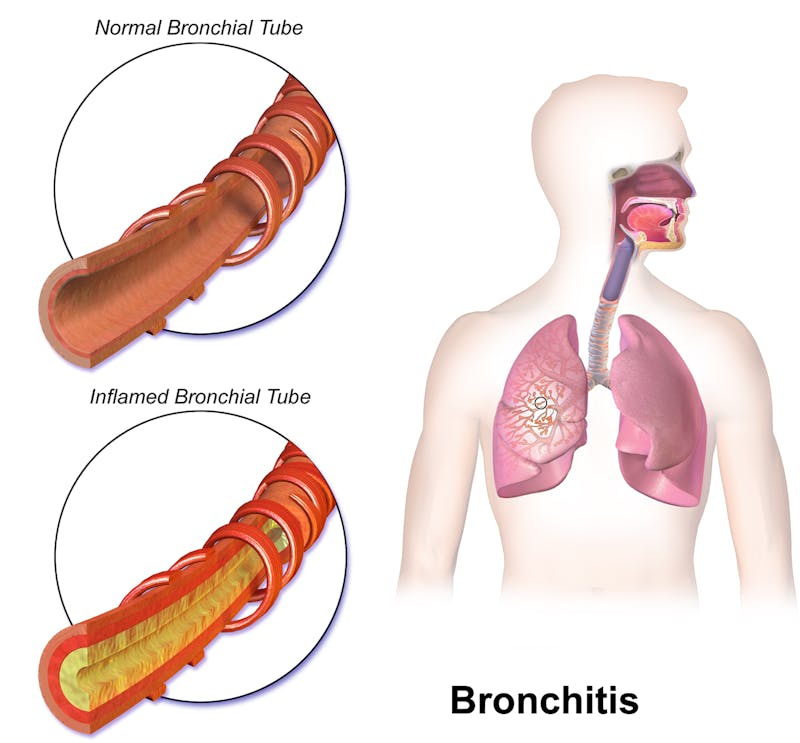Chronic bronchitis
Bronchitis is a condition that develops due to inflammation of airways in the lungs. This inflammation results in too much mucus production, causing breathing problem. There are two main types of asthma- acute and chronic. Acute bronchitis is temporary, and is usually caused by viruses.
Chronic bronchitis is long term inflammation of lungs. It is characterized by a cough with sputum that persists for 3 months and 2 years in a row. It usually occurs among smokers. In some cases, chronic bronchitis occurs with emphysema, and together these diseases are called Chronic Obstructive Pulmonary Disease.

Cause of chronic bronchitis
Cigarette smoking is by far the most important factor in the development of chronic bronchitis. It can occur either due to active smoking or passive inhalation. Other factors for developing chronic bronchitis include:
Occupational exposure
People who have occupation exposure to lung irritants are at great risk of developing chronic bronchitis.
Pollution
Inhalation of dust or fumes from the environment has an irritant effect on lungs.
Family history
It may also occur in individuals who have a family history of chronic bronchitis.
Symptoms
Deep cough is usually the first and most common symptom of chronic bronchitis. It doesn’t go away for months and is caused by increased mucus production. Other common symptoms include:
- Wheezing
- Shortness of breath
- Chest tightness
- Fatigue
- Anxiety
Diagnosis
Your doctor will begin by taking a complete medical history and conducting a thorough physical examination. He/ She may ask you questions about your past health. Your doctor may order a few tests, including:
Spirometry
Spirometry is one of the most common pulmonary function tests. It tells how well your lungs are working. Spirometry measures the lungs ability to move air in and out of the lungs.
Arterial blood gas
It measures the amount of oxygen and carbon dioxide in your blood. In case of chronic bronchitis, you will have less oxygen or more carbon dioxide in your blood than normal.
High resolution computed tomography
It is a special type of CT scan that provides high resolution image of lungs.
Other tests include blood test, chest X-ray.
Treatment of Chronic Bronchitis
The goal of the treatment is to relieve symptoms and slow the progression of disease. Cessation of smoking is the most effective step you can take to manage chronic bronchitis. Quitting smoking, even after you have been diagnosed with chronic bronchitis can slow its progression. If you smoke then ask your doctor to help you quit smoking. If you don’t smoke, then take steps to avoid second hand smoke.
Bronchodilators
Bronchodilators help you breathe better. They open up the airways in your lungs to allow more air to pass through. These are either inhaled or taken orally. Bronchodilating drugs include ipratropium and albuterol.
Corticosteroids
Corticosteroids, taken orally or by inhaler, bring many of the symptoms under control. They reduce mucus production and airway swelling. Long term use of corticosteroids can cause side effects, such as high blood pressure, diabetes and weakened bones.
Oxygen therapy
In severe cases, your doctor may prescribe you oxygen therapy. It helps you breathe better and live a long life.
Vaccinations
To prevent infection, it is important that you have your flu vaccination annually and pneumococcal vaccination every five to seven year.
Antibiotics
Your doctor may prescribe you antibiotics to treat worsening coughs and breathlessness caused by infections.
DISCLAIMER
This web page provides general information and discussions about health, medicine and related subjects. The information and other content provided on this website, or in any linked materials, are not intended and should not be construed as medical advice, nor is the information a substitute for professional medical expertise or treatment.
The content is for information purpose only and is not a medical advice. Qualified doctors have gathered information from reputable sources; however Credence Medicure Corporation is not responsible for errors or omissions in reporting or explanations. No individual should use the information, resources and tools contained herein to self diagnose or self treat any medical condition.
If you or any other person has a medical concern, you should consult with your health care provider or seek other professional medical treatment. Never disregard professional medical advice or delay in seeking it because of something that have read on this blog or in any linked materials. If you think you may have a medical emergency, call your doctor or emergency services immediately.
The opinions and views expressed on this blog and website have no relation to those of any academic, hospital, health practice or other institution. Credence Medicure Corporation gives no assurance or warranty regarding the accuracy, timeliness or applicability of the content.
